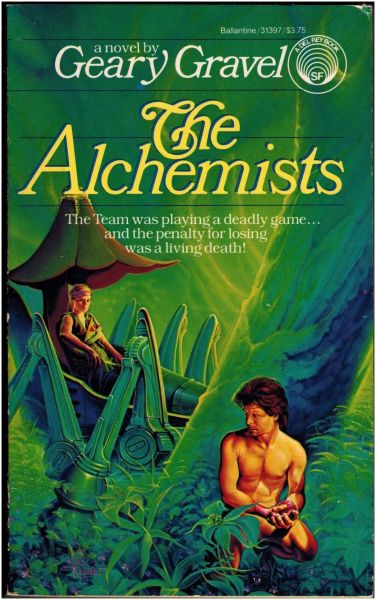Lie For You
The Alchemists (The Alchemists, volume 1)
By Geary Gravel

8 Dec, 2022
1984’s The Alchemists is the first of two volumes in Geary Gravel’s The Alchemists series.
Jonathan Emerson “Emrys” Tate summons experts to Belthannis Autumnworld. There they will assess the native people, the kin, to establish whether or not the kin should be deemed human under Commonwealth law1.
Or so Emrys claims. In fact, he has a different purpose in mind for his team. They will contrive some way to get the kin classified as human despite the fact they very clearly do not qualify.
The crisis shaping recent human politics is two-fold. Firstly, humanity’s vastly more advanced benefactors, the Eylin, recently took their leave of the human-dominated part of the galaxy after centuries of contact. Secondly, the superluminal darkjumpers gifted to humans by the Eylin are failing. During the centuries the Eylin were around, no human acquired the secret of darkjumper fabrication from the aliens. The Eylin have vanished and humanity is faced with the apparent certainty that in the not-too-distant future, humans will be forced back to more primitive, slower, means of interstellar travel. Each human world will be effectively isolated.
A vocal portion of the electorate believe that humanity must exploit the darkjumpers while they still have them. Any world that can support a colony must be settled. Exceptions will be made for worlds with sufficiently human natives. Alas! To date, every group of aliens examined has been deemed insufficiently humanlike and exterminated for the greater good, save for remnants preserved in a museum.
The kin are physically human. Behaviorally, they are not. The kin appear to have no language, no technology, and if their collective behavior can be deemed cultural, the means by which it is transmitted is a mystery. No honest invigilator would ever assess the kin as human. An honest assessment will doom them.
Believing the kin worth saving, Emrys sets his team a challenge quite different than the one they were told to expect. In the limited time available, they must somehow not only lie outrageously about the kin’s true status, they must produce at least one example of the kin who can convince a hostile official that the kin are human and their world should not be appropriated. It is a difficult task. It may well be impossible.
~oOo~
I am easy distracted by problems in a novel’s worldbuilding. This novel presented an interesting problem: it is noted in passing that Belthannis Autumnworld’s year is fourteen standard years long. I fiddled with the relevant equations, which suggest that this world’s sun must be somewhat more massive and brighter than, oh, Vega, and accordingly would last less than a billion years, too short for complex life to appear. It is very clear that the novel is not hard science fiction.
Although it’s not an entirely successful novel — too much exposition can be boring — the novel does have its intriguing elements. Not least of them is that The Alchemists appears to be a foray into Cordwainer Smith territory.
The author’s sometimes lyrical prose depicts a setting of considerable antiquity; spaceflight was developed seven thousand years in the past. The Commonwealth is filled with human worlds, none of which are the same. They are old and varied, like the Smith settings. But the detail that struck me was the depiction of the aliens, the Eylin. The Eylin resemble Smith’s Daimoni, who
were bigger than most of the races of mankind, uniform in size, height and beauty; they bore no sign of youth or age; they showed no vulnerability to sickness; they spoke with mellifluous gravity;
The Eylin are
curious but not prying, reserved but never cold
and
like Man to the hundredth power stronger, smarter, more beautiful. They are like Man as an abstraction or a pure concept: focused, distilled, clarified. They are enough like Man that often their appearance is greeted with hysteria.
Like the Eylin, Daimoni
had come out of nowhere and they went back to the same place.
However, the Daimoni preferred to gift humans with architectural wonders of considerable durability, while the Eylin’s darkjumpers appear to have previously unmentioned flaws. The lesson here is never base an economy on a limited number of irreplaceable treasures with designed obsolescence.
Well, there are much worse models out there.
The novel is anti-colonialist and anti-genocide, No annihilating other peoples to make room for one’s own. This may not seem particularly unusual or noteworthy, but it struck me because I have recently read several Barbara Paul novels. She is quite comfortable with programs for replacing lesser races with their superiors. This novel makes it clear that the humans can and should do better. And if they do … can they ever make amends for previous genocides? Good thing for us that question has absolutely no relevance to modern societies.
Alas, I was not crazy about this. The author clearly expended a fair bit of effort on his prose, but the characters didn’t engage, and as pointed out above, I had issues with the worldbuilding. Still, how many Cordwainer Smith-esque novels are there out there?
The Alchemists is out of print.
1: The Commonwealth is a democracy of sorts. However, one of the elected positions is an emperor who serves for life. Late in the novel, a political crisis ensues when a recently elected emperor immediately abdicates, asserting among other things that if the electorate really wanted an absolute ruler, the least they could do is accept that ruler’s decrees, such as abdication. Response to the abdication is mixed.
